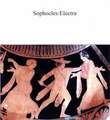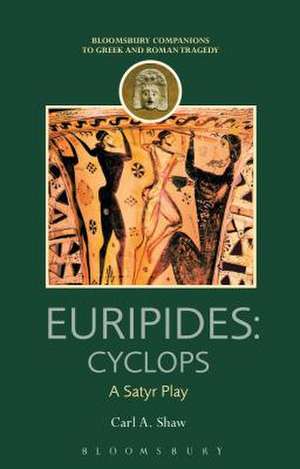Euripides: Cyclops: A Satyr Play: Companions to Greek and Roman Tragedy
Autor Professor Carl A. Shawen Limba Engleză Paperback – 7 aug 2019
| Toate formatele și edițiile | Preț | Express |
|---|---|---|
| Paperback (1) | 150.59 lei 6-8 săpt. | |
| Bloomsbury Publishing – 7 aug 2019 | 150.59 lei 6-8 săpt. | |
| Hardback (1) | 712.23 lei 6-8 săpt. | |
| Bloomsbury Publishing – 7 feb 2018 | 712.23 lei 6-8 săpt. |
Din seria Companions to Greek and Roman Tragedy
- 14%
 Preț: 163.24 lei
Preț: 163.24 lei - 9%
 Preț: 150.96 lei
Preț: 150.96 lei - 9%
 Preț: 150.96 lei
Preț: 150.96 lei - 7%
 Preț: 163.71 lei
Preț: 163.71 lei -
 Preț: 163.24 lei
Preț: 163.24 lei - 14%
 Preț: 163.24 lei
Preț: 163.24 lei - 14%
 Preț: 163.42 lei
Preț: 163.42 lei - 14%
 Preț: 163.24 lei
Preț: 163.24 lei - 7%
 Preț: 163.71 lei
Preț: 163.71 lei - 14%
 Preț: 163.24 lei
Preț: 163.24 lei -
 Preț: 163.34 lei
Preț: 163.34 lei - 8%
 Preț: 152.01 lei
Preț: 152.01 lei - 7%
 Preț: 163.71 lei
Preț: 163.71 lei - 15%
 Preț: 150.59 lei
Preț: 150.59 lei - 14%
 Preț: 163.71 lei
Preț: 163.71 lei -
 Preț: 163.71 lei
Preț: 163.71 lei - 15%
 Preț: 162.54 lei
Preț: 162.54 lei - 24%
 Preț: 150.59 lei
Preț: 150.59 lei - 14%
 Preț: 172.27 lei
Preț: 172.27 lei - 15%
 Preț: 176.07 lei
Preț: 176.07 lei - 23%
 Preț: 234.44 lei
Preț: 234.44 lei -
 Preț: 163.71 lei
Preț: 163.71 lei - 7%
 Preț: 164.05 lei
Preț: 164.05 lei - 14%
 Preț: 163.52 lei
Preț: 163.52 lei - 14%
 Preț: 164.40 lei
Preț: 164.40 lei - 14%
 Preț: 163.34 lei
Preț: 163.34 lei - 15%
 Preț: 150.33 lei
Preț: 150.33 lei - 14%
 Preț: 169.62 lei
Preț: 169.62 lei - 24%
 Preț: 170.42 lei
Preț: 170.42 lei - 24%
 Preț: 163.24 lei
Preț: 163.24 lei - 24%
 Preț: 157.41 lei
Preț: 157.41 lei - 24%
 Preț: 150.68 lei
Preț: 150.68 lei
Preț: 150.59 lei
Nou
Puncte Express: 226
Preț estimativ în valută:
28.82€ • 29.98$ • 23.79£
28.82€ • 29.98$ • 23.79£
Carte tipărită la comandă
Livrare economică 14-28 aprilie
Preluare comenzi: 021 569.72.76
Specificații
ISBN-13: 9781474245807
ISBN-10: 1474245803
Pagini: 176
Ilustrații: 10 bw illus
Dimensiuni: 138 x 216 x 16 mm
Greutate: 0.21 kg
Editura: Bloomsbury Publishing
Colecția Bloomsbury Academic
Seria Companions to Greek and Roman Tragedy
Locul publicării:London, United Kingdom
ISBN-10: 1474245803
Pagini: 176
Ilustrații: 10 bw illus
Dimensiuni: 138 x 216 x 16 mm
Greutate: 0.21 kg
Editura: Bloomsbury Publishing
Colecția Bloomsbury Academic
Seria Companions to Greek and Roman Tragedy
Locul publicării:London, United Kingdom
Caracteristici
Highlights an understudied, though very important, type of Athenian drama (satyr drama), which comprised 25% of a tragedian's output at the City Dionysia
Notă biografică
Carl A. Shaw is Associate Professor of Greek Language and Literature at New College of Florida, USA. He is the author of Satyric Play: The Evolution of Greek Comedy and Satyr Drama (2014) and various articles on Greek drama and culture.
Cuprins
List of FiguresPrefaceNotes for the ReaderList of Abbreviations1. The Cyclops and Satyr Drama2. Viewing the Play: Plot and Performance3. Themes, Issues, and Functions4. Euripides' Cyclops in its Literary ContextEndnotesReferencesGeneral Index
Recenzii
An informative and commendable introduction to what for some may be an unfamiliar and peculiar form of drama . Shaw has done a first-rate job of making this unusual and unfamiliar drama accessible to students, instructors, actors and producers. He has managed to tease a great deal out of the language of the text and the possible impact of the staging, and he persuasively demonstrates how Euripides 'updates one of the most Homeric stories for the Athenian stage, rewriting an archaic myth to fit contemporary society' (118).
There is much of interest and good sense in this useful book.
Concise and thorough introduction to the genre, creative and well-aimed analysis of key aspects of the Cyclops and, for the first time, focus on the staging and the visual experience of this fascinating play: in all respects, a must-have companion to the only complete satyr drama.
I had not fully appreciated how entertaining Euripides' Cyclops is until I read Carl Shaw's contribution to Bloomsbury's Companions to Greek and Roman Tragedy.
By the end of the book, one can admire the abundance of evident as well as ambiguous themes that make Euripides' play a sourcebook of ironic jokes and subtle intertextual allusions. A monograph dedicated to Euripides' Cyclops was doubtless needed, and S.'s skill in offering a useful and in-depth study, comprehensible to a heterogenous audience, is much appreciated.
There is much of interest and good sense in this useful book.
Concise and thorough introduction to the genre, creative and well-aimed analysis of key aspects of the Cyclops and, for the first time, focus on the staging and the visual experience of this fascinating play: in all respects, a must-have companion to the only complete satyr drama.
I had not fully appreciated how entertaining Euripides' Cyclops is until I read Carl Shaw's contribution to Bloomsbury's Companions to Greek and Roman Tragedy.
By the end of the book, one can admire the abundance of evident as well as ambiguous themes that make Euripides' play a sourcebook of ironic jokes and subtle intertextual allusions. A monograph dedicated to Euripides' Cyclops was doubtless needed, and S.'s skill in offering a useful and in-depth study, comprehensible to a heterogenous audience, is much appreciated.
